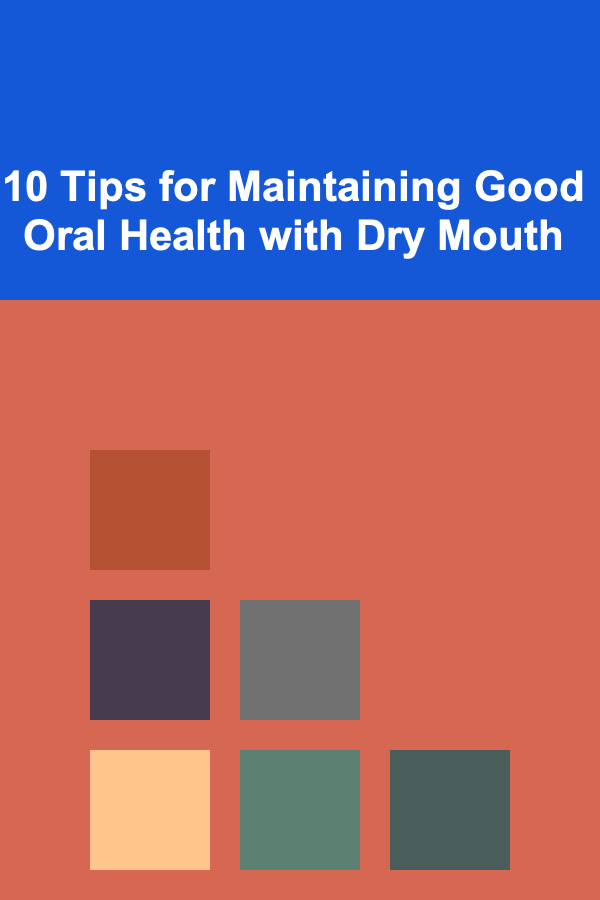
10 Tips for Maintaining Good Oral Health with Dry Mouth
ebook include PDF & Audio bundle (Micro Guide)
$12.99$11.99
Limited Time Offer! Order within the next:

Dry mouth, also known as xerostomia, is a condition in which the salivary glands do not produce enough saliva to keep the mouth moist. This condition can have a significant impact on oral health, as saliva plays a crucial role in cleaning the mouth, neutralizing acids, and aiding in digestion. When saliva production is reduced, it can lead to increased plaque buildup, tooth decay, gum disease, bad breath, and difficulty swallowing.
People with dry mouth often experience discomfort, and if left unmanaged, it can cause long-term damage to oral health. However, with the right strategies and habits, maintaining good oral health while dealing with dry mouth is entirely possible. Below are 10 essential tips for managing dry mouth and keeping your oral health in top shape.
Stay Hydrated Throughout the Day
One of the simplest and most effective ways to combat dry mouth is by staying hydrated. Water is essential in maintaining saliva production and ensuring that the mouth stays moist. It also helps in flushing out bacteria and food particles that may contribute to oral issues.
How to Stay Hydrated:
- Drink Water Regularly: Carry a water bottle with you throughout the day and take frequent sips, even if you don't feel thirsty. Aim to drink at least 8 cups of water daily.
- Avoid Dehydrating Drinks: Be mindful of beverages like coffee, alcohol, and sugary drinks, as they can dehydrate the body and worsen dry mouth. Opt for water or sugar-free beverages instead.
Use Saliva Substitutes
Saliva substitutes are over-the-counter products designed to mimic the effects of natural saliva. These products come in sprays, gels, or rinses and can provide temporary relief for dry mouth symptoms. They help lubricate the mouth, making it easier to swallow, speak, and prevent discomfort.
How to Use Saliva Substitutes:
- Choose a Suitable Product: Look for saliva substitutes that are alcohol-free and sugar-free to avoid further irritating the mouth.
- Apply Regularly: Use these products as needed throughout the day, especially during times when your dry mouth feels particularly bothersome.
Chew Sugar-Free Gum or Suck on Sugar-Free Candy
Chewing sugar-free gum or sucking on sugar-free candies can help stimulate saliva production. The act of chewing increases saliva flow, which helps lubricate the mouth and improve oral comfort. In addition, many sugar-free gums and candies contain xylitol, a natural sugar alcohol that has been shown to reduce plaque buildup and prevent cavities.
Tips for Using Sugar-Free Gum or Candy:
- Opt for Xylitol-Based Products: Look for gum and candy that contain xylitol, as it can promote oral health by reducing bacteria in the mouth.
- Chew or Suck Regularly: Chew gum or suck on candy several times throughout the day to maintain moisture in the mouth.
Maintain a Proper Oral Hygiene Routine
Proper oral hygiene is always essential, but it's even more crucial when managing dry mouth. Without sufficient saliva, the mouth becomes more prone to plaque buildup, tooth decay, and gum disease. Brushing and flossing at least twice a day will help prevent these issues and keep your mouth fresh and healthy.
Oral Hygiene Tips for People with Dry Mouth:
- Brush Gently: Use a soft-bristled toothbrush and fluoride toothpaste to gently brush your teeth twice a day. Avoid brushing too hard, as it can irritate the gums.
- Floss Daily: Floss at least once a day to remove plaque and food particles between your teeth that brushing alone may miss.
- Use an Antibacterial Mouthwash: Rinse with an alcohol-free mouthwash that is designed for dry mouth. This can help reduce bacteria, freshen your breath, and provide additional moisture.
Avoid Tobacco and Alcohol
Tobacco products and alcohol can both contribute to dry mouth and worsen its symptoms. Smoking and using smokeless tobacco products reduce saliva flow and dry out the mouth, while alcohol has a dehydrating effect on the body, including the salivary glands. Avoiding these products can significantly improve your oral health.
Tips for Avoiding Tobacco and Alcohol:
- Quit Smoking: If you smoke, consider quitting to improve your overall health and oral health. Seek support from a healthcare professional if needed.
- Limit Alcohol Consumption: If you drink alcohol, do so in moderation. Drinking water between alcoholic beverages can help prevent dehydration.
Use a Humidifier at Night
Dry air, especially during the colder months, can exacerbate dry mouth symptoms. Using a humidifier in your bedroom while you sleep can add moisture to the air, preventing your mouth from becoming too dry overnight. This is especially helpful for people who breathe through their mouth while sleeping.
How to Use a Humidifier:
- Place the Humidifier in Your Bedroom: Position the humidifier near your bed to ensure the air stays moist while you sleep.
- Clean the Humidifier Regularly: Make sure to clean your humidifier regularly to prevent the growth of mold and bacteria.
Eat Moist, Soft Foods
Dry mouth can make eating difficult, especially when consuming dry, hard, or rough foods. To make eating more comfortable, choose foods that are moist and easy to swallow. Avoid foods that can irritate your mouth, such as spicy or acidic foods, which may cause discomfort.
Tips for Eating with Dry Mouth:
- Eat Soft and Moist Foods: Opt for foods like soups, stews, yogurt, and mashed potatoes that are easy to chew and swallow.
- Incorporate Hydrating Foods: Include fruits and vegetables with high water content, such as cucumbers, watermelon, and oranges, in your diet to help keep your mouth moist.
- Use Sauces and Dressings: If you're eating something dry, consider adding extra sauces, gravies, or salad dressings to make it easier to eat.
Avoid Mouthbreathing
Mouth breathing is a common habit for people with dry mouth, but it can make the condition worse. Breathing through your mouth causes the saliva in your mouth to evaporate, further drying out the tissues. If you have dry mouth, it's important to focus on breathing through your nose whenever possible.
Tips to Avoid Mouthbreathing:
- Practice Nasal Breathing: If you're accustomed to breathing through your mouth, practice breathing through your nose, especially while sleeping or during physical activities.
- Consider a CPAP Machine: If you suffer from sleep apnea and mouth breathing, consider using a CPAP machine, which can help you breathe through your nose during sleep.
Visit Your Dentist Regularly
Regular dental visits are crucial when managing dry mouth. Your dentist can help monitor your oral health, identify early signs of tooth decay or gum disease, and provide recommendations for managing dry mouth. They may also suggest fluoride treatments or special oral health products designed to address dry mouth.
Dental Tips for Managing Dry Mouth:
- Schedule Regular Checkups: Visit your dentist every six months or as recommended for cleanings, exams, and dry mouth management advice.
- Ask About Prescription Products: If over-the-counter products aren't effective, your dentist may prescribe medications to help stimulate saliva production.
Manage Underlying Health Conditions
Dry mouth is often a symptom of an underlying health condition, such as diabetes, Sjögren's syndrome, or a side effect of certain medications. Managing the root cause of dry mouth can significantly improve symptoms. If you suspect an underlying condition, it's essential to work with your healthcare provider to address it.
How to Manage Health Conditions:
- Consult with Your Doctor: If dry mouth persists despite following these tips, talk to your doctor about your symptoms. They can help diagnose any underlying conditions and adjust medications if necessary.
- Review Medications: Certain medications, such as antihistamines, antidepressants, and blood pressure medications, can contribute to dry mouth. If you think your medication is the cause, speak with your doctor about alternative options.
Conclusion
Living with dry mouth can be challenging, but with the right strategies and habits, you can maintain good oral health and minimize discomfort. Staying hydrated, using saliva substitutes, practicing proper oral hygiene, and managing underlying health conditions are key steps in managing this condition. By following these 10 tips, you can ensure that your mouth stays moist, your teeth stay healthy, and your smile remains vibrant despite the challenges of dry mouth.
Reading More From Our Other Websites
- [Home Pet Care 101] How to Prepare a Pet First Aid Kit for Common Home Accidents and Emergencies
- [Personal Care Tips 101] How to Remove Nail Polish From Fabrics and Upholstery
- [Home Budget 101] How to Use the 50/30/20 Rule for Your Home Budget: A Simple Guide to Financial Balance
- [Ziplining Tip 101] Best Zipline Safety Checklists for DIY Harness Setups and Portable Rigging Systems
- [Home Rental Property 101] How to Handle Security Deposits Legally and Fairly
- [Screen Printing Tip 101] Best Practices for Using Discharge Inks on Dark Garments Without Compromising Fabric Integrity
- [Home Cleaning 101] How to Deep Clean Your Kitchen in 30 Minutes
- [Whitewater Rafting Tip 101] Chasing the Rush: A Beginner's Guide to Rafting Waterfalls Safely
- [Stamp Making Tip 101] Choosing the Right Materials for Perfect Paper Stamps
- [Home Lighting 101] How to Create a Balanced Lighting Scheme for Your Home

How to Choose the Right Vehicle for Courier Delivery Services
Read More
How to Invest in Commodities and Natural Resources
Read More
Saving on Pet Expenses: Smart Shopping Tips for Food, Toys, and Vet Visits
Read More
Top 10 Free or Low-Cost Educational Resources for Lifelong Learners
Read More
How to Sharpen Dull Drill Bits for Better Performance
Read More
How to Create a Relationship To-Do List for Busy Professionals
Read MoreOther Products

How to Choose the Right Vehicle for Courier Delivery Services
Read More
How to Invest in Commodities and Natural Resources
Read More
Saving on Pet Expenses: Smart Shopping Tips for Food, Toys, and Vet Visits
Read More
Top 10 Free or Low-Cost Educational Resources for Lifelong Learners
Read More
How to Sharpen Dull Drill Bits for Better Performance
Read More